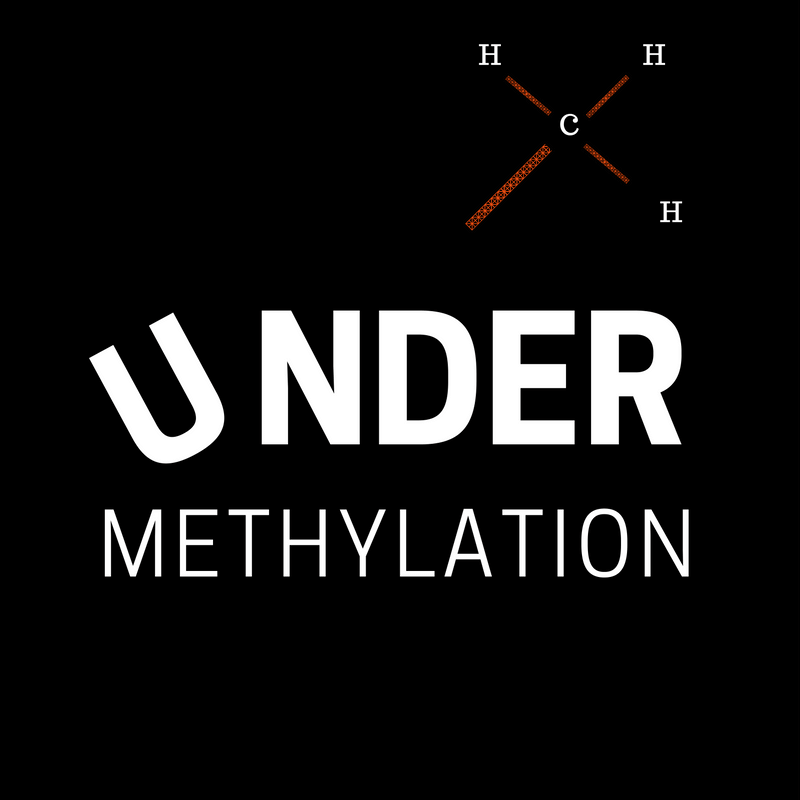There are a number of theories regarding the causes of undermethylation and there is not a simple, single direct test to see how well the methylation process is functioning. In today’s world, methylation problems are commonplace due to food and environmental toxins, emotional trauma, genetic errors, and high stress.
I believe poor methylation is a symptom of something else, likely the gut, rather than being a genetic problem. Genetic testing can reveal many possible diseases and dysfunctions yet we may not actually express them if we follow a healthy, low-stress lifestyle. So perhaps addressing the cause (which may be the digestive system) and supplementing for the symptoms while the gut heals may be the best way to view Undermethylation.
Regardless of how and why we become dysfunctional of optimal methylation, deficiencies in the raw materials required to make our body’ proteins and enzymes, or toxins that interfere with the production of our body’s proteins and enzymes is common. Below are possible ball players in the development of undermethylation;
1. Lack of essential precursors
- methionine
- choline
- betaine
- homocysteine
2. Lack of essential co-factors
- B12
- Folate
- Zinc
- B2, B3 and B6
3. Blood Concentration levels which point toward Undermethylation
- Histamine. Histamine is reduced or broken down by methyl compounds and so with high histamines, the body may become depleted in methyl groups. Because high histamine can deplete methyl compounds, we can partly identify one’s methylation status from their histamine levels. Physician and biochemist Carl Pfeiffer and expert in this field considers histamine levels greater than 70 ng/ml >.6 umol/l) a reliable diagnostic tool for diagnosing undermethylation.
- Basophil count. High basophil counts > 50 cells/cu mm.
- B12. Low blood serum B12 is considered <500.
- Red Cell Folate. Do you have elevated red cell folate levels?
- White Blood Cell (WBC), neutrophils and lymphocytes. Chronically low levels suggest undermethylation.
- Mean Corpuscular Volume (MCV). Increased MCV >90 (High red blood cell volume). Traditionally, B12 deficiency, normally resulting from the poor ability to absorb B12, but also from poor methylation, was diagnosed by finding abnormally large red blood cells
- Red Blood Cell Distribution Width (RDW) >13%
- Haemoglobin. Low haemoglobin <140g/L for males or <135g/L for females.
- Creatinine Kinase. Elevated levels.
- B12 deficiency symptoms despite normal serum B12 levels such as; anxiety, tension, irritability, lack of energy, constipation, tender or sore muscles, poor hair condition, eczema or dematitis, oversensitive to heat or cold, pale skin. Homocysteine levels > 12 indicate B12 deficiency.
The research is not conclusive as to whether Copper and Homocysteine is too high or too low in Undermethylators, as both have been found.
You cannot determine methylation status without proper testing, and self-diagnosis and supplementation is not recommended.
4. Enzyme Polymorphisms
There are several enzymes in the methylation cycle. It’s an extremely complex metabolic cycle and involves the coordination of several enzymes. You cannot change your DNA, however many so-genetic problems are not due to problems with the DNA. They are caused by problems copying the DNA to form RNA, or the production of your body chemicals from the RNA. Mutations in certain genes that code for those enzymes can lead to decreased activity of those enzymes and, therefore, decreased activity of methylation in general. The most important enzymes in that cycle are MTHFR – that’s probably the one that’s best known; it stands for methylenetetrahydrofolate reductase – and then CBS, COMT, VDR, MTR, and MTRR are other genes that are involved in the methylation cycle.
MTHFR Genes C677T and A1298C
MTHFR genetic mutations affect methylation. If you possess a polymorphism of the MTHFR gene, this may be directly associated with poor methylation (undermethylation) or highly efficient methylation (overmethylation).
MTHFR is an enzyme and the MTHFR gene is necessary for the creation of the enzyme which regulates the methyl cycle. The mutation appearance impairs the ability of our body to process folate. This enzyme metabolises folic acid into 5-methyltetrahydrofolate (5-MTHF) which is the vitamin’s active form.
5-MTHF converts the amino acid homocysteine down into another essential amino acid called methionine, which is used by your body to make proteins, utilize antioxidants, and to assist your liver to process fats. Methionine also helps with depression and inflammation. It also helps convert estradiol (E2) into estriol (E3).
Methionine is further converted in your liver into SAM-e (s-adenosylmethionine), which is anti-inflammatory, supports your immune system, helps produce certain neurotransmitters such as serotonin, dopamine and melatonin, and is involved in the growth, repair and maintenance of your cells.
Most literature states there are a good 34-50 different mutations of the MTHFR gene with only two being problematic. These two are on the points at C677T and A1298C. Many chronic illnesses are linked to these mutations.
Fibromyalgia, irritable bowel syndrome, migraines, are all conditions associated with MTHFR anomaly. 98% of autistic children have an MTHFR anomaly. The defective enzyme cannot convert folic acid into its active form properly which can cause high homocysteine levels, which can increase your risk of heart disease and stroke. Homocysteine is poorly converted into glutathione, which is your body’s chief antioxidant and detoxifier. You are then more susceptible to oxidative stress and toxin buildup. Homocysteine is poorly converted into methionine which can increase your risk of arteriosclerosis, fatty liver degenerative disease, increased inflammation, susceptibility to infections, increased free radical damage and produces less SAM-e. Less SAM-e may also cause depression, anxiety and insomnia. Chronic fatigue, infertility and miscarriages are also on the list of problems.
Fortunately you can detect whether you have a mutation of the MTHFR gene by getting a simple blood test. It’s important to understand that gene mutations aren’t always active thus a person can have a gene mutation and not need treatment while others suffer greatly. Anything can turn on or off a gene. This highlights the importance of getting your gene test interpreted by a professional. It isn’t all just about MTHFR issues, most of the time if a person has a MTHFR gene mutations they have many other genetic problems which are also best addressed by a professional.
CBS – cystathionine beta-synthase
This copying error causes high levels of homocysteine, and in severe and rare cases causes homocysteinuria. This is associated with elevated cholesterol, and many other health conditions. CBS polymorphisms can cause problems with RNA and protein synthesis, which is highly dependent upon proper nutrition and can be ruined by toxic metals.
COMT – catechol-O-methyltransferase
This is one of several enzymes that degrades catecholamines such as dopamine, epinephrine (adrenaline), and norepinephrine (noradrenaline). As a result, a problem with this imbalance can cause a varying degree of irritability, agitation, anxiety and other symptoms associated with a high level of catecholamines. COMT polymorphisms can cause problems with RNA and protein synthesis, which is highly dependent upon proper nutrition and can be ruined by toxic metals.
Why is this all happening now?
Slow, poor or “under” methylation is a multi-generational disease, so any gene mutations you have now are the combination of approximately 5 previous generations. It seems that we are breading the problem genetically, photo coping our bad copies of DNA one generation to the next. Stress uses up many methyl groups so if there are not enough and we have a mutation that stops us creating them we are in trouble. If the stress response is using up the methyl groups then this shortage will affect other systems like the brain, thyroid function, digestion, immunity and lead to fatigue to name a few. The spider’s web can be spun using the below modern day lifestyle factors:
-
Physical stress : under-exercising or over-exercising
-
Chemical stress : synthetically manufactured drugs, cleaning products, agricultural chemicals, heavy metals, plastics, air pollution, water pollution, nuclear technology. For example, mercury binds to the amino acid methionine and interferes with methylation. BPA found in plastic water bottles can disrupt the methylation process, triggering DNA changes. The carbon monoxide from cigarette smoke inactivates vitamin B6.
-
Electromagnetic stress : computers, smart phones, tablets, television, microwaves
-
Psychological / Mental stress : negative thoughts, anxiety, depression, aggression, over-analysing, time-restraints, negative relationships, unsatisfying job, stressful life experiences, poor quality of life.
-
Nutritional stress : eating too much or too little, eating incorrectly for your biochemistry, fertilisers, pesticides, herbicides, fungicides, genetic modifications, colourings, preservatives, emulsifiers, thickeners, hormones, anti-biotics.
-
Thermal stress : heat or cold stress
The mirror image copy of the DNA the RNA mold, fro there another mirror image copy of that blueprint is made which becomes the desired protein or enzyme. Our bodies go through this copying procedure thousands of times every second in order to make all of our enzymes and proteins. The likely cause of MTHFR defects and copying errors is zinc deficiency and/or toxic metal poisoning, especially with mercury and copper. These are so common today they are almost universal. The time we live in is nothing at all like the environment our ancestors evolved to live in. Perhaps the reality of migration lead to a situation where a group of individuals who thrived for countless generations in one area (such as the tropics) are much less adapted to the next area they move to (such as a cold area). Also, perhaps due to our sexual reproduction, each individuals genetic makeup have never been tested before. It is all speculative! Feel free to head over to Your Opinions page to correct what I have written here or add to the list.
I believe poor methylation is a symptom of something else, likely the gut, rather than being a genetic problem. Genetic testing can reveal many possible diseases and dysfunctions yet we may not actually express them if we follow a healthy, low-stress lifestyle. So perhaps addressing the cause (which may be the digestive system) and supplementing for the symptoms while the gut heals may be the best way to view Undermethylation.


